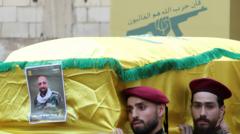Two former Israeli Intelligence agents have recounted how the Lebanese militant group Hezbollah fell victim to a decade-long deception involving booby-trapped Israeli-made walkie-talkies and pagers, ultimately leading to a catastrophic surprise attack on September 17, 2023. Provided via CBS News, their insights unveil a meticulous operation that resulted in thousands of injuries and fatalities, drawing widespread condemnation.
The operation began when Hezbollah unknowingly procured over 16,000 walkie-talkies rigged with explosives from a front company established by Mossad, who disguised their involvement with deceptive business practices. “We have an incredible array of possibilities of creating foreign companies,” remarked one agent, referred to as Michael. They created “a pretend world” to mask their operations inside an intricate network of shell companies.
The agents explained that the explosives were placed in batteries, ensuring that the devices packed enough punch to harm the user while minimizing collateral damage. The operation expanded to include pagers, which were booby-trapped and advertised to Hezbollah, resulting in the militant group purchasing 5,000 of them by September 2024. The pagers were strategically activated when Israeli intelligence perceived that Hezbollah was getting suspicious.
The September attacks caused widespread panic as explosions simultaneously erupted across Lebanon, predominantly in areas heavily frequented by Hezbollah members. Casualties extended beyond the targeted group, resulting in many civilian injuries and fatalities. The international reaction was swift, with the UN Human Rights Chief expressing outrage, labeling the attacks as war crimes and violations of international humanitarian law.
Following the attacks, Israel intensified its military campaign against Hezbollah, leading to escalated conflict in the region. The two sides reached a ceasefire agreement on November 26, 2023, but the implications and ethical concerns surrounding this covert operation continue to generate debate about the legality and morality of such tactics in warfare.


















